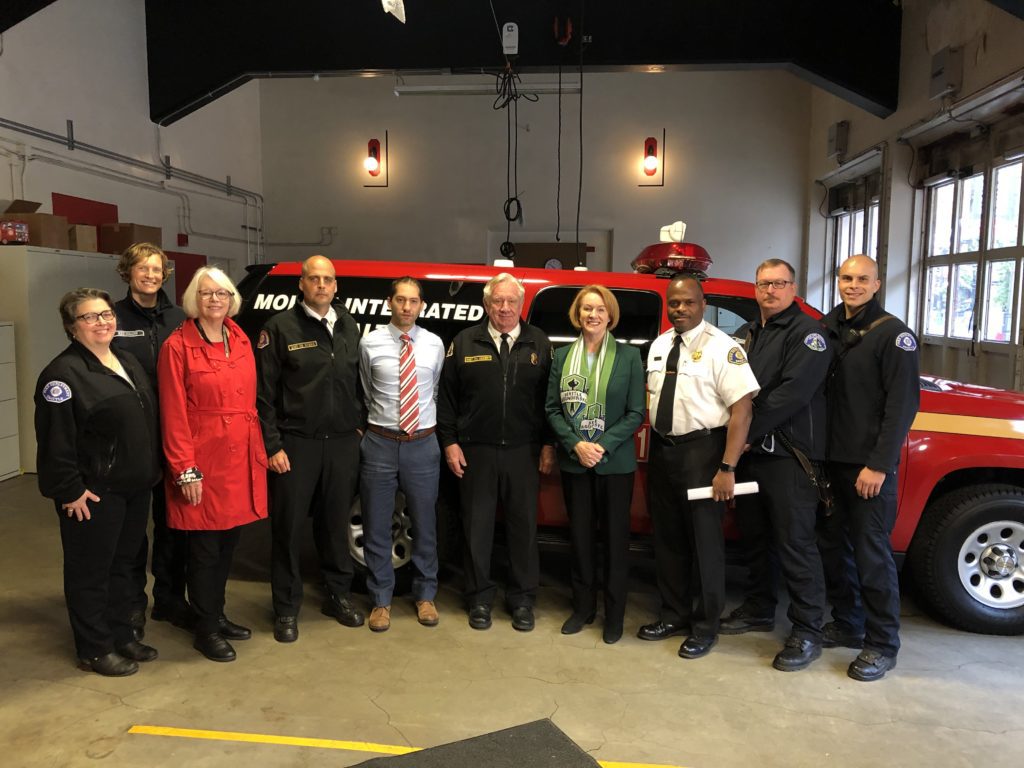Beginning Today, Specially Trained Team of Firefighters and A Social Worker Will Help People Downtown with Behavioral Health or Substance Abuse Issues, Non-Emergency Medical Issues, and Access to Services
Mayor’s 2020 Proposed Budget Being Considered by City Council Would Enhance Health One in Mid-2020 with Additional $400,000 Investment

SEATTLE (November 4, 2019) – Mayor Jenny Durkan, Fire Chief Harold Scoggins, and Councilmember Sally Bagshaw today helped launch Seattle’s new “Health One” unit into service to help address non-emergency 911 calls downtown. Beginning today, the Health One unit, which is staffed with a team of specially trained Seattle Fire Department (SFD) firefighters and a civilian social worker, will help people with non-emergency 911 requests for issues like substance abuse, non-emergency medical issues, and a need to access services.
The team will provide alternatives to transporting individuals to emergency departments, allowing SFD units to focus on emergencies like structure fire and vehicle collisions.
“We are taking an important step for a healthier downtown. As our city grows, our ability to deliver emergency and non-emergency responses needs to keep up. Here in Seattle, we pioneered Medic One, which became the gold standard in emergency health response and now we are pioneering Health One for non-emergency cases,” said Mayor Durkan. “Thank you to Councilmember Sally Bagshaw for her vision and leadership in making this pilot a reality. And as always, thank you to the members of the Seattle Fire Department for all they do to serve our communities.”
In 2018, 42 percent of SFD’s medical calls were deemed “low acuity” calls. These calls dispatched an SFD unit and generally resulted in no action or a non-emergency transport by an ambulance provider to a hospital’s emergency department.
Many of the low acuity calls received by SFD are related to homelessness, mental health, social needs, drug and alcohol use and chronic medical issues. These are healthcare needs that a typical emergency medical response unit is not well equipped to address. SFD can now look beyond the traditional method of transporting patients to an emergency room, and connect them with the appropriate services.
The department has designated a vehicle that will serve as the Health One unit and be stationed at SFD Headquarters at 2nd Ave. and Main St. The unit will operate from 9 a.m. to 7 p.m., Monday through Thursday, responding to calls in the downtown core and adjacent neighborhoods, to include Capitol Hill.
“The two firefighters and civilian social worker we’ve assigned to this unit have received in-depth specialized training on how to address the needs of the patients served by Health One. They are equipped with the resources necessary to provide patients with individually tailored services and diversion options,” said Fire Chief Harold Scoggins.
Referral and transport resources will include urgent and primary care, next day appointments, connection with behavioral health organizations, referral to homeless outreach and shelters, case management within SFD’s High Utilizer and Vulnerable Adult programs and more. In addition to standard emergency medical services equipment, the vehicle is also equipped with outreach supplies for unsheltered clients.
“This pilot program is designed to improve both the patient outcome and reduce wear & tear on our first responders. I am grateful to Fire Chief Scoggins, our fire fighters and all who help us keep our community healthy,”said Councilmember Bagshaw.
“This program will allow the Seattle Fire Department to work efficiently and focus our limited resources on true emergencies – including structure fires, vehicle accidents, gas leaks, hazardous materials spills, urban search and rescue, and life-threatening medical emergencies, just to name a few. At the same time, it will also allow our firefighters to work in partnership with social service agencies to provide the best care possible for all the residents of Seattle,” said Seattle Firefighters Local 27 President Kenny Stuart.
As part of her 2020 Proposed Budget, Seattle Mayor Jenny Durkan proposed investing an additional $400,000 in mid 2020 to enhance the Health One program. Councilmember Bagshaw allocated $475,000 to the Seattle Fire Department in the 2019 budget, and SFD allocated an additional $25,000 for the program. This brings the total to $900,000, which is funded for a full year.
The Seattle Fire Department is also the recipient of an Innovation Funding award from the King County Accountable Community of Health, HealthierHere. This award, for $300,00, will fund program research and analysis support, an additional case manager, and specialized case management software.
The department’s Mobile Integrated Health program manager will closely monitor responses of the Health One unit, and adapt as necessary to improve the patient experience and outcomes of individuals who access the 911 system for non-emergency complaints.
SFD has worked extensively with other City and County partners to research and complement existing programs already in place, such as the Seattle Police Mobile Crisis Unit and County-supported Mobile Crisis Team. The City’s Emergency Response Interdepartmental Team, which consists of SFD, Human Services Department, Seattle Police Department and Public Health Seattle-King County, continues to assess how the City can best address the needs of the people who most frequently utilize the City’s emergency response system, and how interventions might mitigate challenges faced by emergency responders when engaging with frequent utilizers.